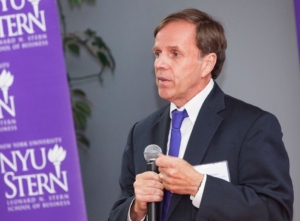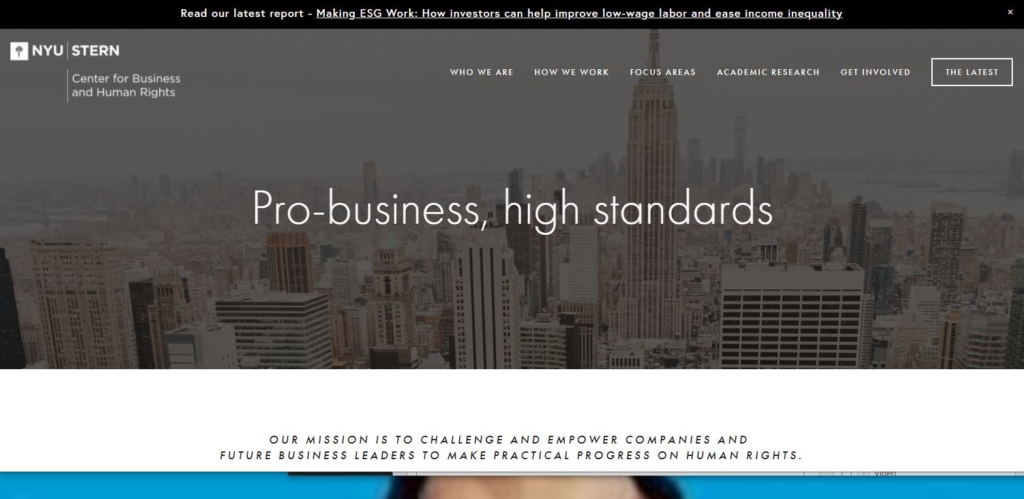
Mike Posner teaches a class at the Center for Business and Human Rights at the NYU Stern School of Business. Founded in 2013, the center is the first of its kind at a business school anywhere in the world.
Mike Posner is a lawyer by trade. He taught law for many years at both Yale and Columbia, and he was executive director of Human Rights First for more than three decades. In the Obama Administration, he served as Assistant Secretary of State for Democracy, Human Rights and Labor.
So when he started talking with his friend and former president of New York University, John Sexton, about the complex issues surrounding the intersection between human rights and business practices, Sexton encouraged him to come to NYU and create a center for human rights at the law school.
Posner had another idea.
“No, I want to be in the belly of the beast. I want to go to the home court,” he told his friend. “I want to go where businesses live and operate, and where they feel comfortable. I want this to be part of business education.”
THE INTERSECTION OF BUSINESS AND HUMAN RIGHTS
In 2013, Posner founded the Center for Business and Human Rights at the Stern School of Business. It is the first center dedicated to human rights in the world to be positioned inside a business school. He still directs the center eight years later, but it now has 10 full-time team members with backgrounds in public policy, law, scholarship, and journalism. “We’re united in our belief that companies should be profitable and competitive while benefiting the people who make their success possible,” reads the center’s website.

Mike Posner, founder and director of the Center for Business and Human Rights at NYU
Academically, the center serves business students at all levels. It started with a course for MBA students, but Posner also teaches at least a couple of classes for the Executive MBA program. Next month, the center is offering its first undergraduate course, while center team members also teach and integrate its research into core undergraduate classes such as Law, Business, & Society; Business & Political Economy; and Business & Its Publics.
“At the beginning, nobody had any idea what we were doing when they applied to Stern. Now, we have a number of students who have written their admissions essays about wanting to come to Stern because we are leading on human rights,” says Posner, the Jerome Kohlber professor of ethics.
“I think Stern feels like this is a differentiator for NYU. We are leading on human rights for a growing number of students who want to study it in course offerings and work on it in their extracurricular work.”
In this conversation with Poets&Quants, Posner explains why he thinks human rights should be a topic of study for the future leaders of business.
Tell us a little more about the decision to position a center for human rights inside a business school.
When I was at Human Rights First, I helped start the Fair Labor Association, working with tech companies to create the Global Network Initiative, and I worked some with the oil and mining companies. So, I had some background in all of these things going back to the 90s. In the Obama Administration, I was running the Human Rights bureau in the State Department. My mandate was democracy, human rights and labor, so these issues sort of came up again.
I realized increasingly that our government is less comfortable advising, guiding, or analyzing what American companies do globally than it is promoting exports or doing public-private partnerships. It’s very keen to go to Microsoft in order to get technology to help track refugees, or to get American companies to help our balance of trade. But when it comes to actually evaluating company conduct, the Commerce Department, Treasury, even the economic bureau of the State Department, leave that alone. I view that as an opportunity.
So, I kept raising my hand to work on these issues. For example, I chaired something called the Voluntary Principles on Security and Human Rights which was created in 2000 to bring mining companies, NGOs, and governments together to look at challenges in the mining industry when a mine is in a conflict zone. I also dealt with blood diamonds through the Kimberley Process. I kept being the only one raising my hand, and so there I was in the middle of all these conversations.
One of the things that occurred to me, honestly, was that our government operated on the theory that everything that really mattered is decided around a calm, big conference table where you have 190 governments come together with their placards and their flags, and they make decisions about how the world is supposed to operate. That might have made sense in 1955, but it doesn’t make sense in today’s world.
When did it start to occur to you that the intersection between human rights and business should be a focus of academic study?
Three examples made me realize that there was a big subject here: One, if you look at the world, we are spending hundreds of billions, trillions of dollars trying to deal with the scourge of terrorism and extremist violence — ISIS and al Qaeda and the like. Well, they may have a flag, but they don’t come to diplomatic meetings. Then there’s a slew of social problems, whether it’s the pandemic or hurricane or natural disasters and all kinds of environmental problems, where governments, even the richest governments, don’t have the capacity to do what they’ve set out to do. And the third piece is business. You know, we sort of operate on the theory that governments are more powerful than business, but if you look at gross domestic product versus revenues, the biggest economies in the world are not states, they’re private companies. Walmart has a revenue of $530 billion a year making it the 24th biggest economy in the world. And I kept saying to people, ‘Why don’t we have an ambassador to Walmart?’
When a company of that size or an Exxon goes in, or any of these huge multinational companies that operate in weak states, they’re important players for good or for ill. We need to recognize that the world has changed and governments now are often challenged by companies. That was my mindset when I came out of government. I said this is too big of a subject to be underserved the way it is.
How receptive was Stern when you approached them about creating a center dedicated to human rights?
We had a very sympathetic dean in Peter Henry, and when I came and presented it to him, he was quite enthusiastic.There was a mixed reaction, honestly from the faculty. We’re part of a quasi department which is called Business and Society, and the guy who headed that at the time, Bruce Buchanan, was enthusiastic from day one. There were other people who were thinking, ‘What is this? We’ve never seen this. What does this have to do with business education?’ So we had a little persuading to do, and I decided to do that by doing things. A combination of teaching, research, and engagement has been our model from the beginning.

The homepage of the Center’s website
I think we have, over eight years, demonstrated that this is a real subject, that it can be done with academic rigor, and it can actually make a difference. The reality is these are the issues that a lot of business leaders struggle with. These are the things that keep leaders of Fortune 500 companies up at night, often when they get caught in the middle of a crisis. It’s important for business schools, teaching the next generations of leaders, to prepare corporate leaders about the subject.
How has the center grown since 2013?
I would view the growth in a couple of different ways. One, we are teaching more classes. I teach basically an MBA only class in the fall and a course in the spring that’s half business and half law students, which is interesting in its own right. They think very differently. I can tell who the law students are and who the business students are. The law students want to regulate, litigate, and legislate, and the business students want to make a deal. Beginning this spring, a colleague is also going to teach an undergraduate course and there’s a lot of interest. Our courses are fully and over subscribed.
The second measure of growth is the students interested in working with us. That is through student volunteers, work studies, and our summer fellowship program, which has really grown as more and more companies and more and more students have shown interest. We also help students in recruitment, and more and more students are getting hired by companies to do this kind of work.
Finally, our staff has grown from two — I came with a colleague from the State Department — to 10 full-time positions. A lot of the work we’re doing is research on different industries and a lot of engagement with companies. We say that we’re pro business, but we want high standards. So we’re trying to apply that in manufacturing supply chains and with migrant workers in construction, for example. With the tech sector, we’re doing a lot looking at misinformation, a range of online privacy issues. And in the investment space, we’re looking at both the ‘S’ in ESG, which is underserved right now, and looking at the lack of diversity among the asset managers. We’ve got a big project now looking at universities and who their university investment offices are hiring, which asset managers, and how many of them are run by women or underrepresented minorities.
NEXT PAGE: Interest in ESG is rising, but can still be a heavy lift.





Questions about this article? Email us or leave a comment below.